
Analysis: Carbon Offset Challenges May Cause Corporations to Rethink Climate Commitments
Efforts to increase the use of carbon credits by companies to offset their greenhouse gas emissions have stalled, raising concerns that some corporations might scale back or abandon their climate goals.
Since the 2015 Paris Agreement, which aimed to limit global warming to 1.5 degrees Celsius (2.7 degrees Fahrenheit), over half of the world's 2,000 largest publicly listed companies have pledged to achieve net-zero emissions by 2050. However, environmental groups are increasingly worried that many of these companies are falling behind on their targets. Corporations, on the other hand, argue that the slow deployment of clean technologies and insufficient government policies are hindering their transition away from fossil fuels.
Supporters of carbon offsets argue that these credits can help companies meet their emissions targets when they struggle to reduce emissions directly. These offsets are generated by projects such as reforestation or adopting cleaner fuels, which either absorb carbon or reduce emissions.
However, the Science-Based Targets initiative (SBTi) recently dealt a significant blow to the expansion of carbon offsets. The non-profit organization, which audits corporate emissions targets, announced that its research indicated carbon offsets are largely ineffective in reducing emissions due to challenges in verifying their climate benefits. As a result, SBTi has postponed its final decision until 2025 on whether to allow companies to use offsets to meet their emissions targets.
This decision marks a reversal for SBTi, which in April had indicated it was considering allowing greater use of offsets in target-setting. Currently, SBTi permits the use of offsets only after companies have met their targets through direct emissions reductions.
Nearly 6,000 companies rely on SBTi to validate their emission targets, with over 2,000 more committed to seeking validation in the future. SBTi is widely regarded as the leading independent third-party validator of corporate net-zero plans due to its emphasis on aligning strategies with climate science.
Tommy Ricketts, CEO of carbon-ratings agency BeZero Carbon, suggested that some companies might reconsider their net-zero goals if they are restricted in using carbon offsets. "Many companies are realizing they may not be able to meet their targets and are considering either finding alternative methods or quietly abandoning their commitments," Ricketts said, although he declined to name specific companies.
A recent SBTi survey revealed that reducing supply chain emissions, known as Scope 3 emissions, was the biggest obstacle companies faced in setting a net-zero plan. An SBTi spokesperson declined to comment on the potential impact of not allowing carbon offsets and mentioned that the review process was ongoing, with the current framework remaining unchanged until next year.
John Lang, who monitors net-zero goals for the Energy & Climate Intelligence Unit, predicted that more companies might scale back their near-term emission targets due to SBTi's stance on carbon offsets. However, he also noted that this could lead to a greater focus on realistic actions to reduce emissions. "Recalibrating targets doesn't necessarily mean a reduction in ambition," Lang said.
Thomas Day, an analyst at the NewClimate Institute, added that companies scaling back their efforts often abandon what he called "unsubstantiated, lofty-sounding ambitions."
Carbon offsets are particularly useful for addressing Scope 3 emissions, which make up the largest portion of a company's carbon footprint and are challenging to reduce due to limited control over suppliers and customers. Expanding the use of carbon offsets could potentially grow the market to $100 billion annually by 2030, up from $723 million last year, according to carbon-offset broker and consultant South Pole.
South Pole CEO Daniel Klier warned that the lack of clarity on validation could cause stagnation in carbon offset volumes. "The uncertainty surrounding guidelines until 2025 is problematic, as it could result in a year of reduced investment in nature and carbon removal projects," Klier said.